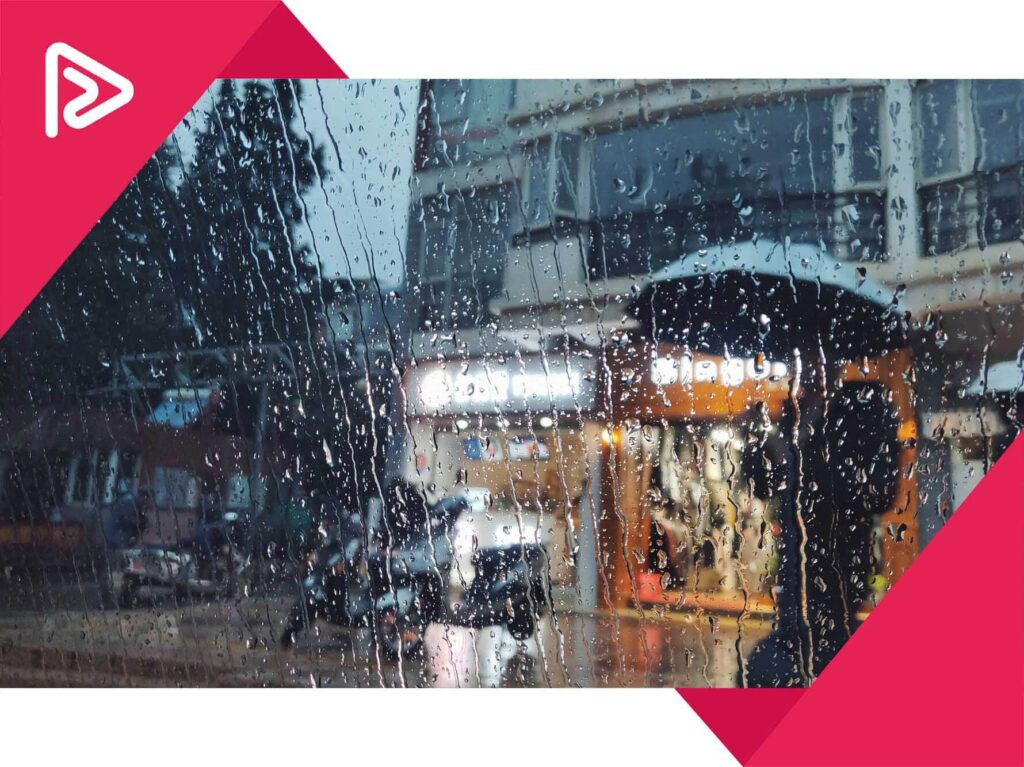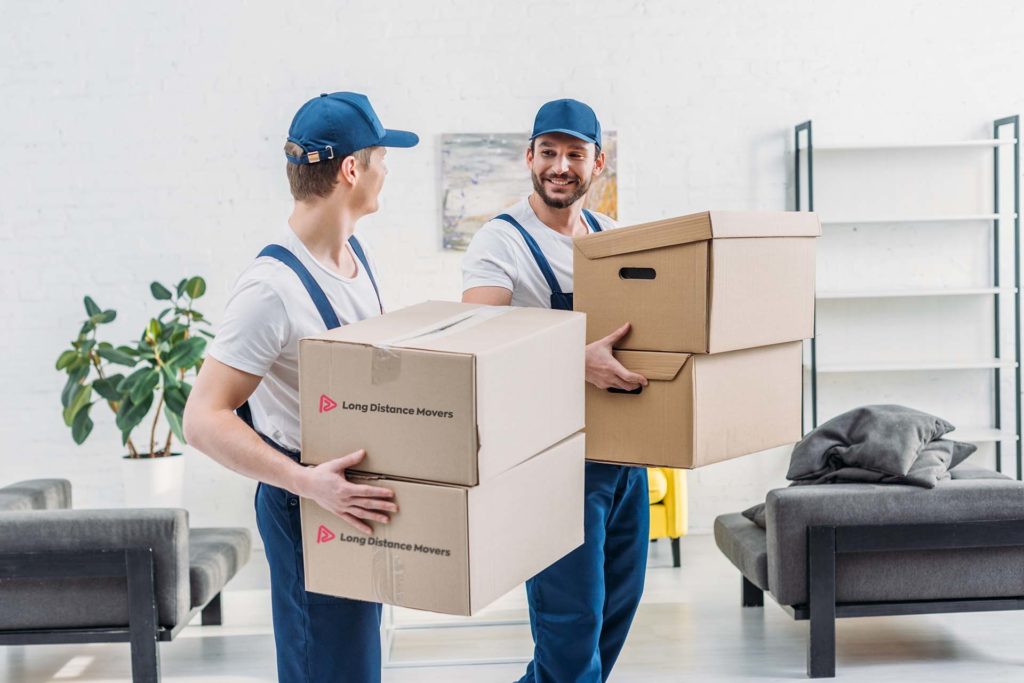Posted in
Moving Preparation, Moving Tips&Tricks
on June 28, 2022

Hannah Michaelson
Hannah is a freelance relocation writer from NYC that has become an expert on packing and unpacking.
Specifics of Moving in the Rain
Everything has been decided on, and you are eagerly awaiting the relocation day, but suddenly you see the weather forecast – chances for precipitation are high. You shudder as the question suddenly arises – “What if it rains on a moving day?”. There is nothing to worry about. Moving in the rain is a common occurrence for a lot of people who have decided to hire cross-country movers and relocate.
How Do You Move Out in the Rain? – Moving in the Rain Is Nothing Difficult, but You Have to Be Adequately Prepared
Is it ok to move in the rain? Relocating in the summer or spring on a warm, sunny day is the ideal situation. However, making plans according to the forecast is, for the most part, not viable, and people also relocate during the winter months and autumn rains. Of course, unfavorable conditions do require some extra preparation, but it is nothing to be afraid of.
Do Moving Companies Move in the Rain? They Most Certainly Do, and Professional Help Is Highly Recommended During the Rainy Season
Professional long-distance movers work during the entire year, no matter what season is in question. Although rainfall can happen any time of the year, it is also good to know that during autumn and winter periods, which are considered to be off-season for relocation, prices tend to drop for long-distance moving services. All in all, professional packing services are recommended when outside conditions are not good since items will be appropriately protected against precipitation.
What to Do When It Rains on Moving Day? Your Items Have to Be Wrapped Tightly on a Rainy Day
You have probably added packing paper on your relocating to another state checklist. However, if a downpour is expected, packing paper is not enough if you want to secure your possessions for transportation. These packing materials are necessary during wet conditions:
- Plastic coverings – Plastic or bubble wrap are the two most important materials when relocating during rainfall. The best thing to do is to wrap each item individually and then wrap boxes additionally. However, this does require a lot of material, and if it doesn’t suit your relocation budget, wrapping boxes tightly can be enough.
- Plastic containers – In theory, if cardboard boxes are well-wrapped in plastic, there shouldn’t be any danger. However, when packing electronics, documents, or other objects that are highly sensitive to moisture, plastic containers are highly advisable. Moisture can damage such items beyond repair, and there is logic in saving on relocating costs
- Shrink wrap – This material is used as a final layer of protection for items (comic books and magazines are often wrapped in this material,) and it provides the best protection against moisture. If you are relocating your business to another state, for example, this material will definitely make you feel safer when organizing your documents for the move.
In general, separate objects that are extra-sensitive to moisture from those that are not. When packing pots and pans, for example, wrapping only the container is enough. However, when packing books, you have to invest in more protective materials. Finally, here is a useful video on how to apply shrink wrap since it is not a frequently used material in households.
You Have to Protect Items if You Use Storage Services
During interstate relocations, storage services are often part of the process. However, during rainy days and seasons, you have to be more careful. Some objects, even if they get wet, can dry once the unpacking after the move starts. However, if soaked objects have to sit for a few days in storage units, not only will the contents of that container be ruined, but there is the danger that mold can spread to other containers as well.
Also, purchasing storage services from a reliable cross-country moving company is the smartest thing to do since you will be sure that containers are in good condition and protected against moisture.
With Valuable Possessions, Either Wait for Better Weather Conditions or Hire Professional Service
If you have to relocate a valuable artwork, for example, and there is a downpour outside, it is not worth the risk. In that case, you simply have to wait for dry weather. But, there is also an option of browsing on the internet “long-distance movers near me” and hiring their service of custom crating. Custom crating means that a special container will be designed for your prized possession, and while inside this container, the item will be completely safe against all external elements.
Also, don’t risk relocating sturdier valuable objects as well. For example, if you have to move a piano, rainfall will make things harder. Not only do such objects require special tools and techniques for transportation, but they are also highly susceptible to moisture. If you are unable to hire adequate services, try to reach an agreement with your landlord to take the item once dry periods return.
Storage Services
Our spacious climate-controlled units will protect your things until the drop-off. No need to worry about them because all items are labeled and secure, and each customer gets a dedicated unit mixup isn’t possible.
Learn more
Learn more
Packing Service
Sit back and relax. We’ve got packing services covered. We use moving blankets, shrink wrap, bubble wrap, and even custom wooden crating. We will protect and carefully handle your stuff during the move.
Learn more
Learn more
Auto Transport
Move your car across the country in an open or enclosed trailer – for an affordable fee. We offer car transport as a standalone service, but you can bundle it with your household move and get a hefty discount.
Learn more
Learn more
Relocating Furniture During Wet Conditions Requires Attention
Can I move a couch in the rain? Yes, you absolutely can. But, when relocating furniture, it also has to be thoroughly protected from moisture, especially the upholstered pieces. When packing furniture, it is necessary to disassemble everything, and this is even more important if precipitation is expected. Simply put, you will be able to wrap everything more thoroughly when dismantled. Here is what should be done:
- After dismantling, all smaller parts should be wrapped in bubble wrap and placed in appropriate containers (preferably waterproof).
- All other sturdier parts, especially upholstered ones, should be wrapped in relocating blankets completely and fixed tightly with tape.
- Finally, bubble wrap should do the job, but adding shrink wrap as the final layer will completely secure pieces of furniture against moisture.
Finally, moving stuff in the rain can be extremely dangerous if you are not careful. First of all, it doesn’t matter what the outside conditions are – if you want to move a heavy object safely, you need to know appropriate techniques and have tools. But, during rainfall, heavy lifting is much more dangerous since the ground might become slippery. The assistance of a long-distance moving company is invaluable here.
Household Appliances Can Easily Get Damaged if Not Protected Against Rainfall
Kitchen and bathroom appliances are highly susceptible to damage if they get soaked. Appliances are electrical devices made of many intricate parts, and if the water reaches any of these integral components, the only thing that is left to do is buy a new device. All sturdy appliances should also be wrapped, as mentioned above, in relocating blankets and shrink wrap.
Prepare the Home Before Packing, Lifting, and Carrying Starts
Since you have decided to relocate, you probably have “perform thorough move-out cleaning” on your relocating to-do list. The cleaning can become quite a chore during rainy conditions. Therefore, you need to prepare your home. Here are some useful tips on how to do that:
- In front of your house or apartment, place mats or rugs in order for people to wipe their feet.
- It is advisable to turn on the heat while lifting and carrying are being performed. It will clean the air of moisture and make the job much more comfortable.
- You should designate a single path along which all containers and objects should be carried. This path should be covered with cardboard, and by doing so, you will protect your floors, but also, the floors won’t be slippery.
- Take all old towels, rugs, and linen and use them to wipe any water puddles or mud off your floors. This should be done immediately after you spot a stain on the floor. Also, a person should wait in the trailer and try to wipe all containers as much as possible once they are loaded.
Don’t Forget to Protect Yourself From Rainfall as Well
If the weather forecast says that there are high chances of precipitation, don’t forget to leave all rainy day apparel out when packing clothes. And don’t forget about boots (ideally at least two pairs) when packing your shoes. It is also nice to have umbrellas (although they can’t be used when lifting). Any kind of hat or cap will do the trick as well.

Protect yourself as well
Here Are Some Valuable Tips for Moving in the Rain Based on Prior Relocation Experiences
How do you move in bad weather? As you can see, moving homes in the rain does require some specific actions if you want to keep your possessions intact. Here are some more things to consider when relocating to a new state during a rainy period:
Labels
Relocating labels for boxes are an essential part of every relocation. You have probably applied the “Fragile” sticker when packing fragile items. However, during rainfall, one of the best relocation tips is to apply the sticker ” Don’t place on wet surfaces” on containers that have objects sensitive to moisture.
Trash bags
If you are relocating on a tight budget, getting more protective materials because of rainfall will never feel good. However, you can take trash bags and wrap all smaller containers with them. The key is just to secure them tightly with tape, and they should work just as well as professional materials do.
Shorter distances
When the relocating truck comes, ask the driver to park it as close to your home as possible. Not only will this give more protection against rainfall, but it will also ease the carrying of heavy objects.
Item prioritization
If the rainfall doesn’t last for the entire day, start by packing glasses, pots, pans, and other stuff that isn’t affected by moisture, and then move on to electronics and upholstered furniture.
Drying station
You can place a tent by the relocating truck, the so-called “dry zone” where people who are loading or unloading can rest and use towels and rugs if needed. Also, this is quite useful when using relocating tools since a certain amount of time is needed for detaching the items from tools, and you will need cover.
Unloading order
If the forecast says that there will be rainfall in the place where you are relocating, the good idea is to load first in the truck highly sensitive items. By doing so, they will have to be unloaded last, and by that time, rainfall might stop.
Assembly line
If possible, have two teams, one inside and one outside. Of course, the outside team will need to sacrifice themselves a bit more since they will be out in the open carrying stuff to the truck, but the home will be completely protected from unnecessary water puddles and mud stains.
Is It Good Luck if It Rains on Your Moving Day? Relocations by Themselves Can Bring a Lot of Joy
Don’t listen to superstitial nonsense when relocating. Some say that rainfall brings luck and others say misery, but only one thing is certain. Relocation has many benefits, and it doesn’t matter what season you pick to change your address. The only important thing is to do everything properly in order to have a pleasant and efficient move, and these tips can help a lot.










